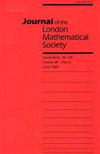Characterizing slopes for 5 2 $5_2$
IF 1
2区 数学
Q1 MATHEMATICS
Journal of the London Mathematical Society-Second Series
Pub Date : 2024-06-06
DOI:10.1112/jlms.12951
引用次数: 0
Abstract
We prove that all rational slopes are characterizing for the knot , except possibly for positive integers. Along the way, we classify the Dehn surgeries on knots in that produce the Brieskorn sphere , and we study knots on which large integral surgeries are almost L-spaces.
确定 5 2 5_2$ 的斜率特征
我们证明,除了可能是正整数外,所有有理斜率都是结 5 2 5_2$ 的特征。同时,我们对 S 3 $S^3$ 中产生布里斯科恩球 Σ ( 2 , 3 , 11 ) $\Sigma (2,3,11)$ 的结上的德恩手术进行了分类,并研究了大积分手术几乎是 L 空间的结。
本文章由计算机程序翻译,如有差异,请以英文原文为准。
求助全文
约1分钟内获得全文
求助全文
来源期刊
CiteScore
1.90
自引率
0.00%
发文量
186
审稿时长
6-12 weeks
期刊介绍:
The Journal of the London Mathematical Society has been publishing leading research in a broad range of mathematical subject areas since 1926. The Journal welcomes papers on subjects of general interest that represent a significant advance in mathematical knowledge, as well as submissions that are deemed to stimulate new interest and research activity.

 求助内容:
求助内容: 应助结果提醒方式:
应助结果提醒方式:


